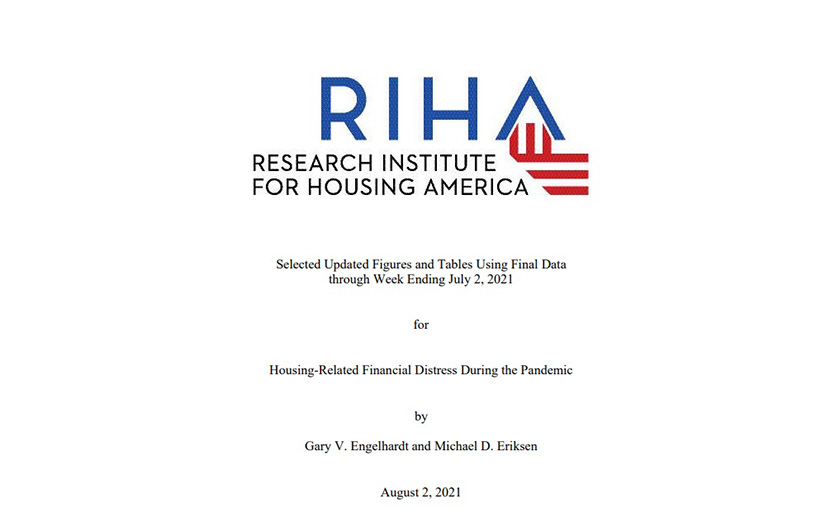
RIHA: Fewer Households Missed Housing Payments in Second Quarter

Slightly under five million households did not make their rent or mortgage payments in the second quarter, updated research from the Mortgage Bankers Association’s Research Institute for Housing America reported.
RIHA’s study, Housing-Related Financial Distress During the Pandemic, found that 8.6% of renters, or 2.86 million households, missed, delayed or made a reduced payment in June, while 4.6% of homeowners (2.19 million) missed their mortgage payment.
In addition, 28 million student debt borrowers (44.8%) missed payments in June, up from 26 million in March, RIHA reported.
“Given the level of government support during the pandemic and the more recent improvements in the economy and labor market, it is quite possible that the observed levels of rental non-payments may be at or close to pre-pandemic levels,” said Gary V. Engelhardt, Professor of Economics in the Maxwell School of Citizenship and Public Affairs at Syracuse University. “However, the recent rise in COVID-19 cases, and elevated inflationary pressures, could slow economic growth and hiring. These potential headwinds could also impact households still facing hardships.”
Since the pandemic started in second-quarter 2020, 6.8% of renters and 5.7% of homeowners have missed four or more payments. Missed rental payments now total $41.7 billion, missed mortgage payments total $76.5 billion and missed student loan payments total $155 billion.
“Homeowners’ employment situation and ability to make their mortgage payments has meaningfully improved since the onset of the pandemic,” said Edward Seiler, Executive Director with the Research Institute for Housing America and MBA Associate Vice President of Housing Economics. “Most homeowners still behind on their payments are in a mortgage forbearance plan. For those still facing hardships once their forbearance plan expires, loan modifications, payment deferrals, and loan payoffs–through either refinancing or a home sale–are all options that could prevent a foreclosure.”
RIHA Study – Second-Quarter 2021 Key Findings:
- Slightly fewer renters and homeowners missed payments in the second quarter of 2021 compared to the first quarter. However, more renters and homeowners missed their June payment than their March payment.
- 2.86 million renters (8.6%) and 2.19 million (4.6%) mortgagors missed payments in June, up from 4.53 million households who missed payments in March (7.2% of renters and 4.5% of mortgagors).
- Property owners continue to play a key role in helping renters:
- 11.0% of renters missed one payment over the fifteen months of the pandemic, 4.4% missed two payments, 2.7% missed three payments, and 6.8% missed four or more payments.
- In aggregate, rental property owners lost as much as $7.10 billion in second-quarter revenue from missed rent payments. This was down from $7.48 billion in the first quarter of 2021.
- Over the five quarters of the pandemic, aggregate missed rental payments have reached $41.7 billion.
- On average, in the second quarter of 2021, 9.7% of renters received permission from their landlord to delay or reduce their monthly payment (by week).
- Homeowners were the least likely of the three groups to miss a payment since the second quarter of 2020:
- 85.4% of mortgagors made all their mortgage payments, 5.6% missed one payment, 1.9% missed two payments, 1.4% missed three payments, and 5.7% missed four or more payments.
- On average, in the second quarter of 2021, 15.5% of mortgagors received permission from their servicers to delay or reduce their monthly payment (by week).
- In aggregate, total missed mortgage payments were estimated to be approximately $10.8 billion for the second quarter ($12.2 billion for the first quarter).
- Over the five quarters of the pandemic, aggregate missed mortgage payments have reached almost $76.5 billion.
- Receiving unemployment insurance (UI) benefits:
- Renters – Rose from 3% at the beginning of April 2020 to a weekly average of 11% in July 2020. UI benefits have trended down since to approximately 5%-6% in May and June 2021.
- Homeowners – UI benefits have declined from around 6% in June 2020 to approximately 2.5% in June 2021.
- Student debt borrowers were the most likely of the three groups to miss one or more payments:
- 28.2 million student loan borrowers (44.8%) missed payments in June 2021, up from March (41.8%; 26.1 million).
- 13.3% of student loan borrowers have missed one payment over the last fifteen months, 7.4% missed two payments, 4.8% missed three payments, and 33.7% missed four or more payments.
- The percentage of borrowers reporting missed payments (by month) was around 44.3% in the quarter (43.2% in the first quarter of 2021).
- In aggregate, 37.3 million individuals missed at least one student loan payment since the beginning of the pandemic.
- In aggregate, total missed student loan payments were estimated to be as much as $32.9 billion for the second quarter of 2021, and $155 billion since the second quarter of 2020.
RIHA’s research contains data from an innovative household survey from the Understanding America Study (UAS), an internet panel survey of over 8,000 households specially tailored to study the impact of the pandemic. Authored by Engelhardt and Michael D. Eriksen, Associate Professor of Real Estate at the University of Cincinnati, the study provides close to real-time economic data on the rapidly evolving financial consequences of the pandemic by following the same set of households from before the outbreak through the end of March 2021. Findings were previously released in May 2021 (first-quarter 2021 findings), February 2021 (fourth-quarter 2020 findings), October 2020 (third-quarter 2020 findings), and September 2020 (second-quarter 2020 findings).
MBA’s RIHA is a 501(c)(3) trust fund. RIHA’s chief purpose is to encourage and assist – through grants to distinguished scholars and subject matter experts, educational institutions, research facilities, and government organizations – establishment of a broader-based knowledge of mortgage banking and real estate finance. Visit http://www.housingamerica.org for more information.
